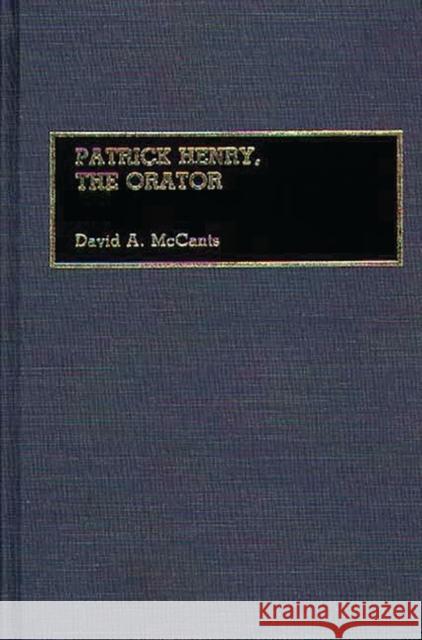Patrick Henry, the Orator » książka
Patrick Henry, the Orator
ISBN-13: 9780313262104 / Angielski / Twarda / 1990 / 176 str.
Best known for his Liberty or Death address, the oratorical essence of the American Revolution, Patrick Henry, Virginia patriot, statesman, and foremost orator of the Revolutionary period, is scrutinized in this eighth volume in the Greenwood Press "Great American Orators" series. Taken as a whole the volumes chronicle the role of public discourse in the United States and fill the void that has existed in American public address. In "Patrick Henry, The Orator," David A. McCants develops fresh perspectives on an illustrious orator who excelled in two of the classical genres of rhetoric--the forensic and the deliberative. McCants gives a creative and compelling interpretation of the rhetorical efficacy of Henry's Liberty or Death speech, making a strong prima facie case for his evangelical explication. Rhetorical topics such as delivery, modes of proof, style, organization, effect, and more are examined within the context of the historical exigencies that motivated Henry and shaped his responses. The culture and politics of eighteenth-century Virginia as well as biographical factors that shaped Henry's development are explored in depth. Also included are six important speech texts with critical materials that provide students and scholars of the history and criticism of American public address a more comprehensive basis for understanding Henry's rhetorical reputation.
Patrick Henry's development as a popular orator is traced in Part I, which presents critical analyses of the orator and his speeches during his Protest and National periods and in legal venues. In these chapters McCants focuses on the rhetorical considerations of speaker and speech, purpose and effect. Part II contains texts of the important addresses discussed in the preceding critical analyses. These collected speeches and speech reports include The Parsons' Cause Case, the conclusion of the Caesar-Brutus speech in the Stamp Act Debate of May 1765, the Liberty or Death speech, two speeches from the Ratifying Convention Debate, and Patrick Henry's defense in the British Debts Case. A chronology of major speeches lists all of Henry's known addresses as well as the places and dates of the speeches and attests to the scope of rhetoric in the United States. The bibliography contains carefully described historical collections and gathers together primary and secondary sources that bear on the speaker and the oratory. An index closes the volume. Students and scholars of rhetoric, public oratory, and American history will find this notable study an invaluable research tool.











